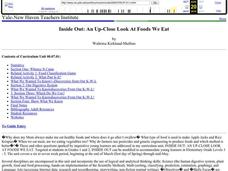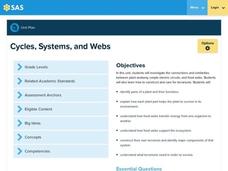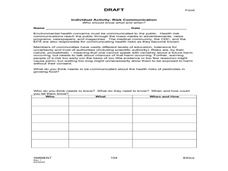Curated OER
Food Without Oil
Students discuss the oil crisis and how it affects the food they eat. In this food production lesson plan, students look at the foods sold in their grocery store and imagine which would leave if there was no oil to ship the food. They...
Nemours KidsHealth
Food Safety: Grades 9-12
Food poisoning, salmonellosis, E. Coli, shigellosis, tapeworms—all these words can strike fear into eaters. Alas, the five-second rule is not necessarily true! Two activities teach teens safety rules for food purchasing, preparation,...
Curated OER
Food Chain
Fourth graders use a database on animal diversity to complete the lesson. Using the information, they discover how organisms are linked to one another by their dependence on each other for food. In groups, they develop their own food...
Curated OER
Construction of Food Chains and Tracing Energy Changes
If you need a few basic activities for teaching food chains to your emerging ecologists, here they are. Three sheets of organism cards are included for learners to cut out and arrange according to trophic relationships. To make the most...
Curated OER
Great Lakes Food Web
Young scholars identify species and components of a Great Lakes food web. Using note cards, they place themselves in the correct order of the food chain based on the species present. They discuss what they believe happens to various...
Curated OER
"Wet" Your Appetite: Conserving Water
Students investigate how water is utilized in producing food. For this agriculture lesson, students examine how much water goes into the creation of their daily menu. Students create a new menu that can conserve water and cut their water...
Curated OER
Food Chains
Students study food chains by creating their own slide show using KidPix. They compare information after sharing their slide shows as a whole group. As the children are watching the slide shows of their peers, they tally every time...
Curated OER
Kansas Crops: From Seeds to Food
First graders explore U.S. geography by researching food production. In this agriculture lesson, 1st graders identify the process of crops from a seed to a plate and discuss the importance of farmers in the production of such crops....
Curated OER
Everyone Up!
Students examine various agriculture careers, both direct and indirect, related to crop production and distribution. In this food production lesson, students role play the processing chain in which crops move from producer to processor...
Curated OER
Food Systems Feed the World
Students discover how getting food from farm-to-fork involves several steps and many hands. For this interactive food chain lesson, students respond to a series of questions about food distribution then work collaboratively to create a...
Curated OER
Food Safety-Consumers Need the Facts
Students begin by completing a survey asking them to rank their concerns about commercially prepared foods. They develop a definition of relative risk, and complete the "Pro or Con" worksheet. Students work in groups to make a study of...
Curated OER
Food Webs
Students recognize interdependence in a food web by using yarn and notecards to create a food web and discussing what would happen if one of the organisms from a certain trophic level is removed.
Curated OER
Inside Out: An Up-Close Look At Foods We Eat
Fourth graders identify the origins of meats and vegetables consumed by humans on a daily basis. They classify foods (meats, dairy products, grains...) and create a food pyramid.
Curated OER
Food Web Mystery
Students describe typical marine food webs, and explain why food is generally scarce in the deep-ocean environment. They discuss reasons that seamounts may support a higher density of biological organisms than would appear to be possible.
Curated OER
Ecuadorian Rainforest
Have your class talk about the importance of the rainforest and the products that come from it. Learners watch a video showing the path of chocolate from the rainforest to the supermarket. They discuss how the rainforest and chocolate...
Curated OER
Supply Chain Management
Learners identify the steps of production. In this supply chain activity, students determine how businesses monitor production and trace the supply chain of products they own. Learners also discuss ethical issues related to the supply...
Curated OER
Observation Milk Fat Lesson
Turn your class loose to experiment with the different fat content in skim milk, whole milk, half and half, and heavy cream. This is a visually vibrant experiment, as learners drip food coloring on the surface of the products and measure...
Curated OER
The Customer Service Chain
Students identify and interpret the importance of customer service.
Then they identify the concept of customer chain and the meaning of the quality paradigm. Students also identify and define the role of quality in competitiveness and...
Curated OER
From the Farm to Your Table: Where Does Our Food Come From?
Students discover where the food they eat comes from. Using maps, they identify the agricultural areas of the United States and the products that are grown in each area. Using the internet, they research how food gets to America from...
Pennsylvania Department of Education
Cycles, Systems, and Webs
Fourth graders review the parts of the plant and their functions. In this plant lesson, 4th graders recognize that plants must transfer energy to make food. Students understand the interdependence of organisms in an ecosystem.
Curated OER
Polymers Lab: Bouncy Ball and Slime
Eighth graders investigate chemical reactions to produce polymers. In this polymers lesson plan, 8th graders experiment with sodium silicate and ethyl alcohol to make a polymer. They also experiment with borax and glue to make a polymer....
Curated OER
Plankton
Students explore how to collect plankton and use microscopes to observe and identify it. They collect the plankton sample and classify the various components of the plankton. Students identify organisms in the plankton and draw...
Curated OER
How is Your Food Grown
Students consider how their food is grown due to pesticide use. They reflect on the harm done to the various groups, then discuss the ethical questions from the perspectives of different stakeholders. IN addition, they compile relevant...
Curated OER
Webbing the Food Chain
Students compose a visual representation of the food chain cycle using Inspiration educational software.

























